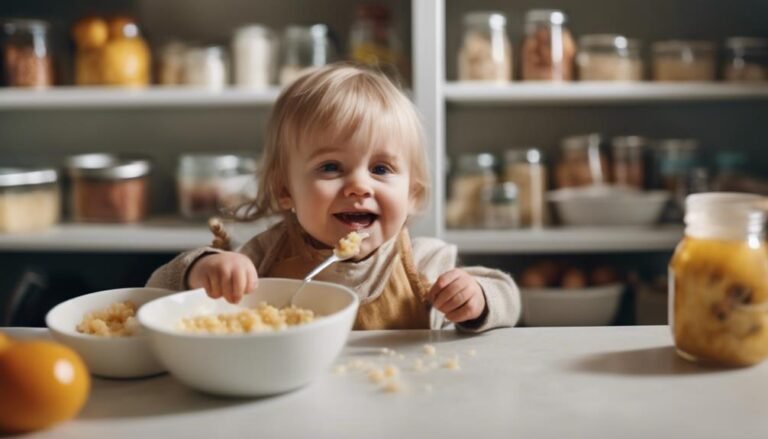The Importance of Iron in Your Toddler's Diet: A Must-Read for Parents
As a parent, you strive to provide the best for your toddler, nurturing their growth and ensuring their well-being. However, amidst the array of dietary advice, the significance of iron often remains overlooked. Did you know that iron is a crucial component in your toddler's diet, impacting their physical and cognitive development like no other nutrient? Understanding the importance of iron intake for your little one is essential, and knowing how to incorporate it effectively can make a substantial difference in their overall health.
Key Takeaways
- Iron supports toddler's growth and brain development.
- Iron deficiency can cause growth delays and cognitive issues.
- Including iron-rich foods like lean meats and fortified cereals is crucial.
- Iron is vital for neurotransmitter production and attention span.
- Regularly monitoring iron levels in toddlers is important for their health.
The Role of Iron in Growth

Iron plays a crucial role in supporting your toddler's growth and development. As your little one continues to explore the world and learn new skills, their bodies are working hard behind the scenes to keep up with their development. Iron is a key player in this process, helping to ensure that your toddler has enough energy and oxygen to fuel their growth.
Without an adequate amount of iron in their diet, your toddler may experience delays in growth and development. Iron deficiency can lead to issues such as decreased appetite, fatigue, and a weakened immune system, making it harder for your child to reach important developmental milestones.
To support your toddler's growth, make sure to include iron-rich foods in their meals. Foods such as lean meats, poultry, fish, beans, and fortified cereals are excellent sources of iron that can help meet your child's daily needs. By prioritizing iron in your toddler's diet, you're setting them up for success in their growth journey.
Iron's Impact on Brain Development
Ensuring your toddler's brain develops optimally requires more than just providing basic nutrients. Iron plays a crucial role in your child's cognitive development, impacting their ability to learn, focus, and retain information. Without sufficient iron, your toddler may experience developmental delays and learning difficulties. To emphasize the importance of iron in your toddler's diet, let's take a closer look at how iron influences brain development:
| Impact of Iron on Brain Development | Description |
|---|---|
| Neurotransmitter Production | Iron is essential for the production of neurotransmitters, which are crucial for transmitting signals within the brain. |
| Myelin Formation | Iron is necessary for the formation of myelin, a substance that insulates nerve fibers and speeds up signal transmission in the brain. |
| Cognitive Function | Iron deficiency can impair cognitive function, affecting memory, problem-solving skills, and overall brain performance. |
| Attention Span | Adequate iron levels support sustained attention, helping your toddler stay focused and engaged in various activities. |
| Emotional Regulation | Iron plays a role in emotional regulation, influencing your child's mood, behavior, and social interactions. |
Iron Absorption in Toddlers
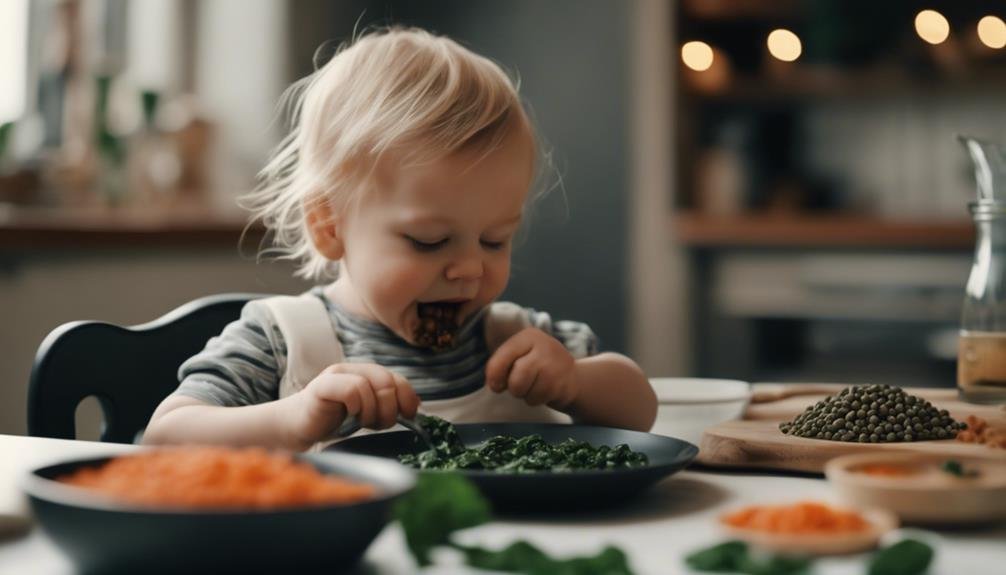
Curious how your toddler's body absorbs iron and what you can do to enhance this process for optimal health? Iron absorption in toddlers is a crucial aspect to consider for their overall well-being.
To start, it's essential to know that the type of iron found in plant-based foods (non-heme iron) isn't as readily absorbed by the body as the iron from animal sources (heme iron). However, you can boost your toddler's iron absorption by pairing non-heme iron sources with foods rich in vitamin C. For example, serving a glass of orange juice with a bowl of fortified cereal can significantly enhance iron uptake.
Additionally, limiting calcium-rich foods during iron-rich meals can also help improve absorption. Remember, providing a varied diet that includes both heme and non-heme iron sources, along with vitamin C-rich foods, can support your toddler's iron absorption and promote their overall health.
Signs of Iron Deficiency
Noticing subtle changes in your toddler's energy levels and overall well-being may indicate a potential iron deficiency. If your little one seems more tired than usual, irritable, or unusually pale, it could be a sign that their iron levels are low.
Keep an eye out for increased infections or a decreased appetite as well. Sometimes, children with iron deficiency may exhibit pica, a condition where they crave non-nutritive substances like dirt or ice.
If you notice any of these signs, it's crucial to consult with your pediatrician promptly. Iron deficiency can impact your child's growth, cognitive development, and overall health if left untreated.
Your healthcare provider can conduct tests to determine if your toddler is indeed lacking iron and recommend the appropriate steps to address the deficiency. By being attentive to these subtle changes and seeking medical advice when needed, you can help ensure your toddler's iron levels are where they should be for optimal health.
Iron-Rich Foods for Toddlers
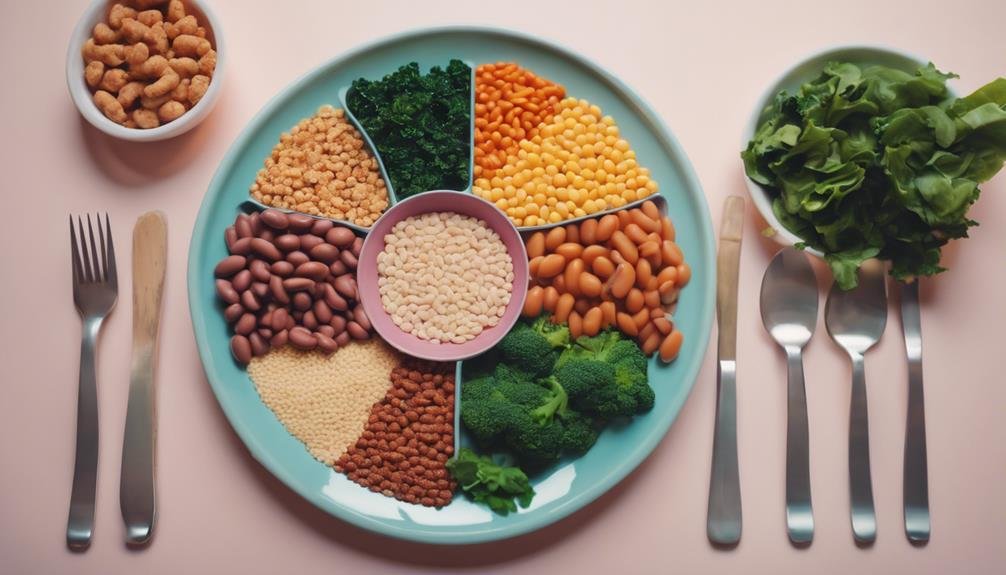
To ensure your toddler gets an adequate amount of iron, incorporate these iron-rich foods into their diet. Iron is crucial for your little one's growth and development. Below are some delicious and nutritious options to boost their iron intake:
| Food | Iron Content (per 100g) |
|---|---|
| Spinach | 2.7mg |
| Lentils | 3.3mg |
| Lean Beef | 2.6mg |
Spinach is a versatile vegetable that can be added to smoothies, pasta sauces, or omelets. Lentils are not only high in iron but also a great source of fiber and protein, making them a fantastic addition to soups or salads. Lean beef is packed with heme iron, which is easily absorbed by the body. Try making meatballs or beef stir-fry for a tasty iron-rich meal.
Iron Supplements for Children
Considering your toddler's nutritional needs, incorporating iron supplements may be beneficial to ensure they're meeting their daily iron requirements for optimal growth and development. Iron supplements can be particularly helpful if your child is a picky eater or has an increased need for iron due to certain health conditions.
Here are some key points to keep in mind when considering iron supplements for your child:
- Consult with a Healthcare Provider: Before starting your toddler on iron supplements, it's essential to consult with their pediatrician or a healthcare provider to determine the right dosage and ensure it's safe for your child.
- Choose Quality Supplements: Look for iron supplements specifically formulated for children to ensure they're getting the appropriate amount in a form that's easy for their bodies to absorb.
- Monitor for Side Effects: Keep an eye out for any potential side effects such as constipation or stomach upset. If you notice any concerning symptoms, contact your healthcare provider promptly.
Balancing Iron With Other Nutrients
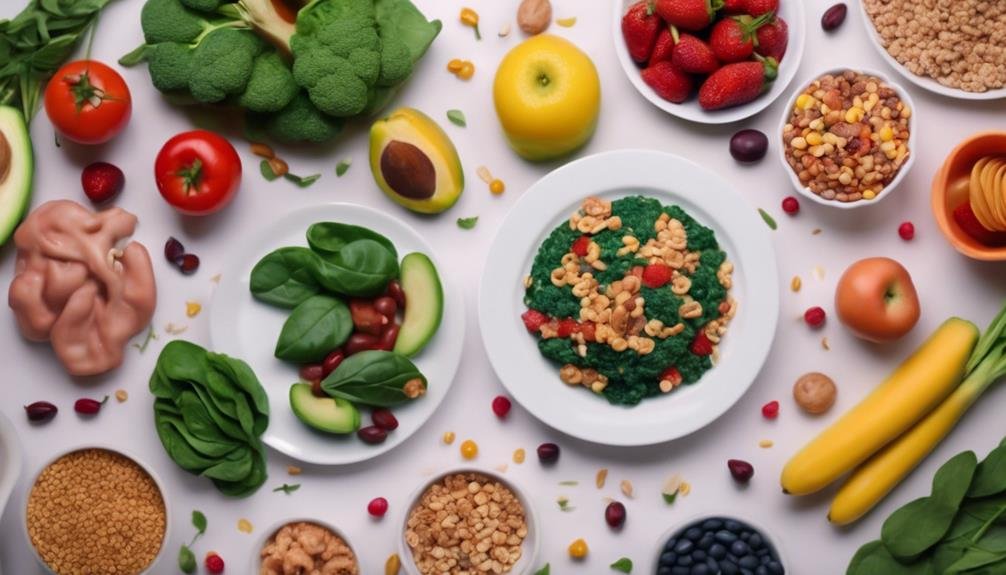
To ensure your toddler's overall health and development, it's important to balance the intake of iron with other essential nutrients in their diet. Iron is crucial, but so are vitamins, minerals, and macronutrients like protein and carbohydrates. Providing a variety of foods ensures your child gets a spectrum of nutrients that work together for optimal growth.
Incorporate foods rich in Vitamin C alongside iron sources to enhance absorption. Fruits like oranges, strawberries, or bell peppers can complement iron-rich foods like lean meats or fortified cereals. Including sources of Vitamin A, such as sweet potatoes or carrots, can also support iron utilization in the body.
Additionally, don't forget about healthy fats! Avocado, nuts, and seeds are excellent choices to support overall nutrient absorption. Balancing iron with these nutrients not only aids in absorption but also promotes a well-rounded diet for your growing toddler. Remember, variety is key to meeting all their nutritional needs.
Cooking Tips to Retain Iron
Enhance your toddler's iron intake through smart cooking techniques that help retain this essential nutrient. Iron is crucial for your child's growth and development, so it's important to make the most out of iron-rich foods.
Here are some practical tips to retain iron content while cooking:
- Avoid overcooking: Cooking foods for too long can deplete their iron content. Opt for methods like steaming or stir-frying to preserve the iron levels in the food.
- Pair with vitamin C: Vitamin C enhances iron absorption, so try to include foods rich in vitamin C, like citrus fruits or bell peppers, in the same meal as iron-rich foods.
- Use cast iron cookware: Cooking in cast iron pans can increase the iron content of your food. This is especially beneficial when preparing acidic foods like tomatoes, which can leach iron from the cookware.
Monitoring Your Toddler's Iron Levels
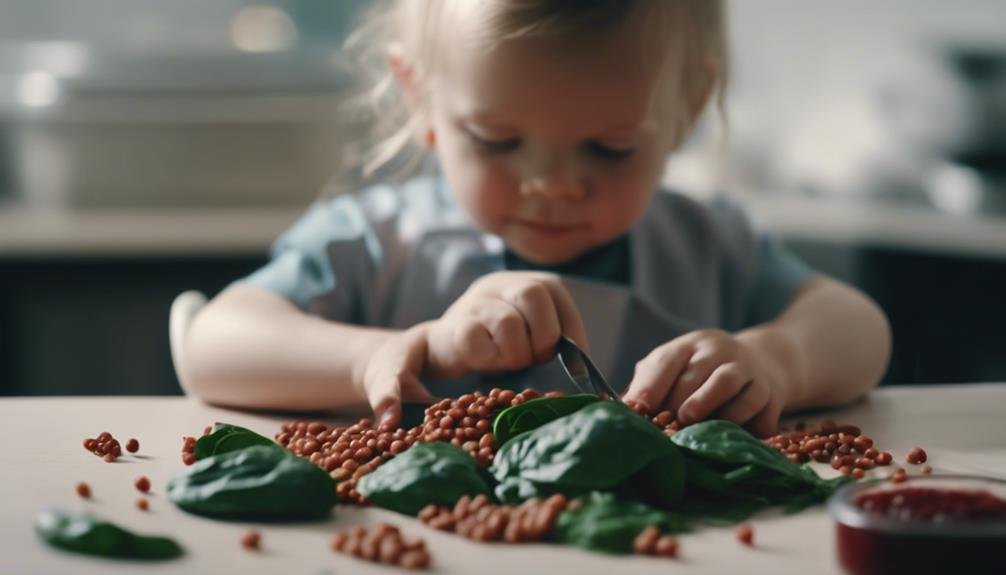
Monitoring your toddler's iron levels is crucial to ensuring they're getting an adequate amount of this essential nutrient for their growth and development. To keep track of your child's iron status, consider scheduling regular check-ups with their pediatrician. During these visits, the doctor can conduct simple blood tests to measure your toddler's hemoglobin and ferritin levels, which indicate their iron levels.
Additionally, be vigilant for signs of iron deficiency in your toddler, such as pale skin, fatigue, irritability, and difficulty concentrating. If you notice any of these symptoms, consult with your child's healthcare provider promptly.
Incorporating iron-rich foods into your toddler's diet is essential, but monitoring their iron levels ensures that their body is absorbing and utilizing this vital nutrient effectively. Remember, every child is different, and their iron needs can vary. By staying proactive and informed about your toddler's iron levels, you can help support their overall health and well-being.
Frequently Asked Questions
Can My Toddler Get Too Much Iron From Their Diet?
You might wonder if your toddler can get too much iron from their diet. While too much iron from food is rare, be cautious with iron supplements as excessive intake can be harmful.
How Can I Make Sure My Toddler Is Getting Enough Iron?
Make sure your toddler gets enough iron by offering iron-rich foods like lean meats, beans, fortified cereals. Pair them with vitamin C sources for better absorption. Talk to your pediatrician if you have concerns.
Are There Any Natural Ways to Increase Iron Absorption in Toddlers?
When aiming to boost iron absorption in your toddler naturally, pair iron-rich foods like lentils with vitamin C sources such as citrus fruits. This combo enhances iron uptake. Remember, small changes can make a big difference in your child's health.
Can Low Iron Levels in Toddlers Affect Their Behavior?
Low iron levels in toddlers can indeed affect their behavior. When iron is low, toddlers might become irritable, tired, or have trouble concentrating. Ensuring they get enough iron-rich foods can make a positive difference in their behavior.
What Are Some Iron-Rich Vegetarian Options for Toddlers?
So, you're looking to boost your toddler's iron intake with vegetarian options. Try lentils, spinach, tofu, quinoa, fortified cereals, and beans. These tasty choices can help keep your little one healthy and strong.
Conclusion
So, remember, iron is like the superhero nutrient for your toddler's growth and development. Make sure to include iron-rich foods in their diet to keep them strong and smart.
And hey, if you ever feel like your little one needs a boost, don't hesitate to talk to your healthcare provider about iron supplements.
Your toddler's health is no joke, so let's iron out those deficiencies and watch them thrive!



